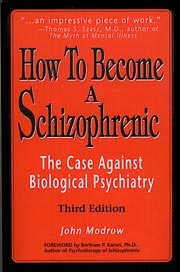![[Successful Schizophrenia logo, RETURN TO HOME PAGE]](../GRAPHICS/SSWDSMAL.GIF)

How to Become a Schizophrenic: The Case Against Biological Psychiatry
John Modrow
$25.95 (paper)
© 2003 John Modrow. Writers Club Press/iUniverse
Ordering Information
Synopsis:
How to Become a Schizophrenic is divided into three parts. In Part I the author utilizes the ideas of Harry Stack Sullivan, Theodore Lidz, Gregory Bateson, R.D. Scott and P.L. Ashworth, W. Ronald D. Fairbairn, Anton Boisen and others--as well as his own experiences--to construct a comprehensive theory which explains how and why people become schizophrenic.
Part II is the story of the author's own schizophrenic episode--a gripping novelette similar to I Never Promised You a Rose Garden--and a dramatic illustration of the theories and principles formulated in the first part of the book. Rather than an illness, schizophrenia is seen as the culmination of a series of progressively worsening personality disorders spanning three or four generations.
In Part III the author critically examines the evidence which purportedly proves that schizophrenia is a disease. He cites fact after fact showing why it is highly unlikely that schizophrenia is an actual organic illness. Finally, he explains why--despite its essential unsoundness--the medical model (or disease hypothesis) is universally accepted.
In this present 2003 edition the author shows that the newest "wonder drugs" now used in treating schizophrenia--e.g., clozapine (Clozaril), risperidone (Risperdal), olanzapine (Zyprexa), quetiapine (Seroquel), ziprasidone (Geodon)--are every bit as bad as the older chemical lobotomies they have replaced.
Praise for How to Become a Schizophrenic:
"...an impressive piece of work."
-- Thomas S. Szasz, M.D., author of The Myth of Mental Illness
"...demonstrates the physical, psychological, and social harm resulting from the label schizophrenic and the continuous need to reexamine the underpinnings and attitudes of psychiatry."
-- Booklist
"Like Richard Wright in Black Boy, Modrow compels the rehumanization of human beings who are dehumanized by their social system."
-- Bruce E. Levine, Ph.D., author of Commonsense Rebellion
"Of all the books written about schizophrenia ... none is more comprehensive, accurate, thorough, and clearer in style and statement than John Modrow's classic How to Become a Schizophrenic. Modrow, who is a recovered schizophrenic and is, perhaps, the unrecognized and unappreciated world's foremost authority on this disorder, has performed a truly invaluable service and has made the major contribution to our understanding of the causes and cures of this pseudodisease."
-- Robert A. Baker, Ph.D., former chairman of the Department of Psychology, University of Kentucky; author of They Call It Hypnosis, Hidden Memories: Voices and Visions from Within and Mind Games: Are We Obsessed with Therapy?
"One of the best things I've read on the subject...I am struck by the richness of the ideas and the research and the soundness of the conclusions."
-- Peter R. Breggin, M.D., founder and director of the International Center for the Study of Psychiatry�and Psychology; author of Toxic Psychiatry and Talking Back to Prozac
"...a very important contribution to the field."
-- Theodore Lidz, M.D., former chairman of the Department of Psychiatry, Yale University; author of The Origin and Treatment of Schizophrenic Disorders and Schizophrenia and the Family
"...intellectually powerful..."
-- Paul Gotkin, coauthor of Too Much Anger, Too Many Tears
"...well researched and easily readable (a difficult combination to achieve)!"
-- Judi Chamberlin, author of On Our Own: Patient-Controlled Alternatives to the Mental Health System
"...meticulously challenges all the major research that claims that schizophrenia is a biological disorder."
-- Ty C. Colbert, Ph.D., author of Broken Brains or Wounded Hearts: What Causes Mental Illness
"...clear, precise...Modrow provides more than reasonable doubt as to the medical model..."
-- Matt Lee, Ph.D., University of Sussex
"Before reading the book, I was largely convinced that schizophrenia was primarily a brain disease. Modrow has forced me to take a second look, however, and reconsider the psychological causes of the condition."
-- The Vancouver Sun
"...it is ennobling that despite bad and discouraging treatment he was able to understand himself and others, and share that acquired knowledge in an accurate and helpful way."
-- Bertram P. Karon, Ph.D., professor of clinical psychology, Michigan State University; author of Psychotherapy of Schizophrenia
"...gives clear proof that there's real hope. Truly a remarkable book!"
-- Alan Caruba, Bookviews
Ordering Options for How to Become a Schizophrenic:
- Order from Powells.com
- Order from Amazon.com
- iUniverse.com, or call toll-free: 1-877-823-9235.
![[Successful Schizophrenia logo, small, RETURN TO HOME PAGE]](../GRAPHICS/SSWDSMAL.GIF)
| Home | Articles | Resources | Stories | Weller-than-Well | Links | Archives | Contact |
© 1995-2007 Successful Schizophrenia